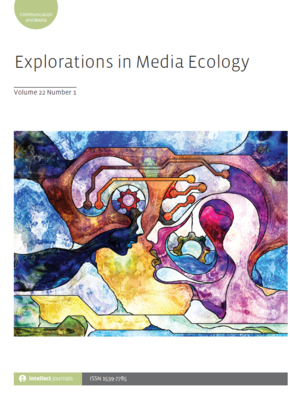
Explorations in Media Ecology 17.4 is now available
Intellect is pleased to announce that Explorations in Media Ecology 17.4 is now available!
For more information about the issue, click here >> https://www.intellectbooks.co.uk/journals/view-issue,id=3685/
Contents
The official journal of …
Authors: Lance Strate
Reflections of a media ecology flâneuse: On mediated urban spaces and places
Authors: Susan J. Drucker
Cities are rich informative environments. This has been dubbed the urban century with, for the first time in human history, more than half the world’s population living in cities. Cities are global, smart, connected, inclusive, livable, green, sustainable, mega and communicative. The urban experience is increasingly influenced by technology. From photography to the mobile phone, augmented reality and the GPS, the person/environment relationship is altered by media technologies. Urban communication is a growing field examining communication in urban sites and urban influences on communication. What is the relationship between media ecology and urban communication? From Benjamin and McLuhan to Postman and Strate, this article explores the connections between urban communication and media ecology and suggests urban spaces and places call out for the attention of media ecologists.
Hot media, technological transformation and the plague of the dark emotions: Erich Fromm, Viktor Frankl and the recovery of meaning
Authors: Barry Liss
This article takes the position that our contemporary overheated media environment lends itself to comfortable passivity, resulting in mental breakdown in the guise of the dark emotions: anxiety, melancholia and boredom. This is especially the case with the inevitable synergy of the upcoming technological transformations from genetic modification, virtual reality simulacra and artificial intelligence/robotics. After discussing the data from the World Health Organization regarding the stark increase of people across the globe suffering from depression and anxiety, this article weds the concepts of McLuhan’s hot–cool distinction with Fromm’s delineation of the productive character orientation. Following Fromm, this article argues that joy ensues from reason, productive labour and love–sorrow from ignorance, alienated work and indifference. When we wilfully abrogate our responsibilities to self and other via non-participational mediated forms, we cede away our potential for growth and development. This leads to the emotional breakdowns of guilt, boredom, anxiety and melancholia. Viktor Frankl’s logotherapeutic perspective is discussed as a counterbalance to the social effects wrought by our overheated technological environment. Frankl’s stress on phenomenological meaning as the cornerstone of existence provides a lens to understanding the affects of an over-reliance on technological gadgetry.
Authors: Matthew S. Lindia
The genealogy of the textbook as an educational form: Orality and literacy in education
Authors: Norm Friesen
In this article, I provide a short but broad history of the textbook as a multimedia pedagogical and cultural form. In doing so, I pay particular attention to the interrelationship of oral and textual media and cultures, highlighting the ways that these two communicative modes are reconfigured over the history of this pedagogical form. I also situate the textbook in the context of changing instructional methods and practices, and I demonstrate that instructional forms and practices have neither progressed along with new technologies nor gradually evolved from a primitive orality to sophisticated literacy. Instead, I show that these practices as well as textbook media change much more in synchrony with larger cultural and epistemological developments – such as those identified by Michel Foucault, Friedrich Kittler and other historians of media and culture.
Authors: Robin Beth Levenson
Poetry
Authors: Nico Vassilakis
Authors: Paul Levinson
Photography: ‘A brothel without walls’ or the ‘Abundant art’?
Authors: John Dowd
The daguerreotype, republican style and theories of the public image
Authors: Cara A. Finnegan
Working through immigration with images
Authors: Jens E. Kjeldsen
Photojournalism is a vital resource for thinking, feeling, expressing, acting and dealing with problems of collective living, argues Robert Hariman and John Louis Lucaites. It is a kind of ‘equipment for living’. This article proposes the concept rhetorical working through as a way of describing how photojournalistic rhetoric functions as ‘equipment for living’. It argues that humans constantly perform three kinds of rhetorical working through: dealing with issues and arguments, dealing with social relations and dealing with identity and self.
Radical plurality and visual witnessing
Authors: Wendy Kozol
Normalization of war: The photographer’s cut
Authors: Jon Simons
On the necessity for visualcy
Authors: Julianne H. Newton
Love in the ruins? Or, photography’s radical promise
Authors: Robert Hariman
Book Reviews
Authors: Elaine Kahn And Sheryl Perlmutter Bowen And Lori Ramos And Katherine G. Fry And Margaret M. Mullan And Donald Fishman And Carolin Aronis
- Looking for Marshall McLuhan in Afghanistan: iProbes and iPhone Photographs, Rita Leistner (2014)
- The Communication Panacea: Pediatrics and General Semantics, Eva Berger and Isaac Berger (2014)
- Small Arcs of Larger Circles: Framing through Other Patterns, Nora Bateson (2016)
- Exploring the Roots of Digital and Media Literacy, Renee Hobbs (ed.) (2016)
- Black Ops Advertising: Native Ads, Content Marketing, and the Covert World of the Digital Sell, Mara Einstein (2016)
- Regulating Social Media: Legal and Ethical Considerations, Susan J. Drucker and Gary Gumpert (eds) (2013)
- Communication and the Baseball Stadium: Community, Commodification, Fanship, and Memory, Dale Herbeck and Susan J. Drucker (eds) (2017)

